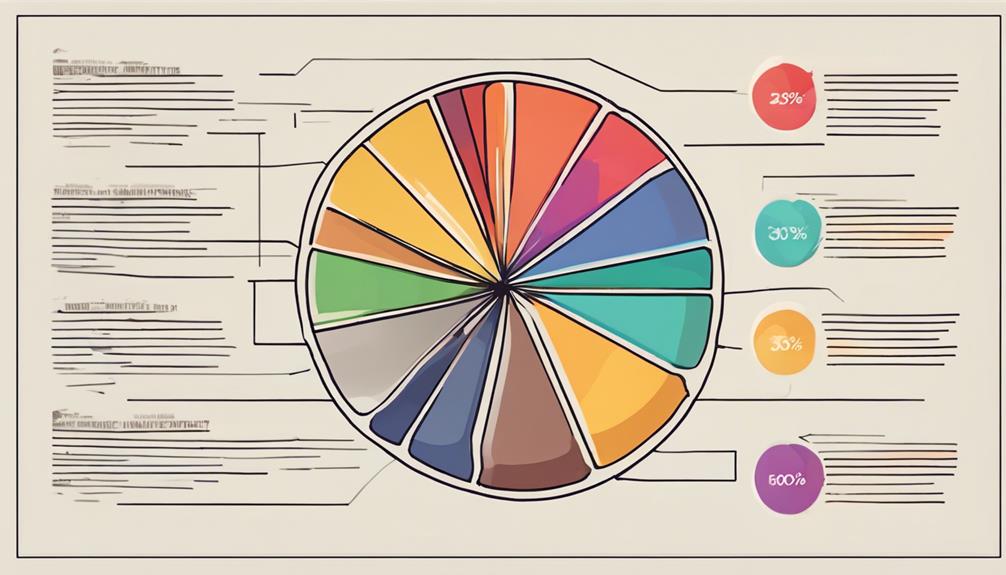Budgeting is a fundamental aspect of financial management that provides individuals with a structured approach to their monetary affairs. By creating a budget, individuals gain insights into their financial health, cultivate disciplined spending habits, and work towards achieving their financial goals. Understanding the significance of budgeting goes beyond mere numerical calculations; it is about empowering oneself to take control of their financial future. The impact of budgeting extends far beyond just numbers on a spreadsheet; it influences decisions, behaviors, and ultimately, financial well-being.
Key Takeaways
- Budgeting is crucial for financial stability and effective resource allocation.
- It instills financial discipline, controls spending, and promotes savings.
- Tracking expenses and setting financial goals are integral to successful budgeting.
- Budgeting leads to better financial health, reduced stress, and long-term financial security.
Definition of a Budget

A budget is a structured financial plan that systematically forecasts and details expected income and expenses for a defined period, serving as a foundational tool for effective resource allocation and financial decision-making. It plays a crucial role in helping individuals and businesses manage their finances by estimating how much money will be earned and spent over a specified timeframe. By outlining income sources and anticipated expenses, budgets provide a clear overview of financial activities, enabling individuals to make informed decisions to achieve their financial goals.
In essence, a budget acts as a financial roadmap, guiding spending, saving, and prioritizing expenses based on available income. It is an essential tool for controlling spending, avoiding debt, and ultimately working towards financial security. Through the process of budgeting, individuals can monitor their financial health, identify areas for improvement, and make adjustments to ensure long-term financial stability. Overall, setting a budget is a fundamental step towards effective financial management and achieving desired financial outcomes.
Importance of Budgeting
Budgeting plays a crucial role in fostering financial discipline and ensuring future planning assurance. By adhering to a budget, individuals are better equipped to manage their spending habits, prioritize financial goals, and work towards achieving long-term aspirations such as homeownership. The discipline instilled through budgeting not only helps in avoiding unnecessary debt but also serves as a roadmap for realizing financial stability and security.
Financial Discipline Benefits
Understanding the significance of budgeting in fostering financial discipline is crucial for individuals seeking to attain stability and control over their finances. Budgeting is important as it sets spending limits, encourages living within one's means, and cultivates healthy spending habits. By sticking to a budget, individuals can achieve financial independence and enhance their overall financial health. Prioritizing expenses within a budget empowers individuals to make informed financial decisions, leading to improved financial habits and reduced overspending. Moreover, budgeting helps manage unexpected expenses, alleviating financial stress and contributing to better mental health. Through a clear overview of income, savings, and expenses, individuals can gain control and confidence in managing their finances effectively.
Future Planning Assurance
The practice of conscientious financial planning through budgeting not only fosters immediate financial discipline but also lays a solid foundation for securing future financial stability and assurance.
Key Points:
- Setting financial goals and working towards achieving them effectively.
- Ensuring a structured plan to manage income and expenses for financial stability and security.
- Prioritizing spending, saving for milestones, tracking financial progress, avoiding impulsive spending, managing debt, and preparing for unexpected financial emergencies all contribute to a more secure and planned future.
Budgeting acts as a roadmap for financial success, guiding individuals towards a more assured and stable financial future by enabling them to make informed decisions and stay on track with their financial objectives.
Financial Management Significance

Financial management is a critical aspect of budgeting, as it enables individuals to strategically allocate resources for various needs. By understanding the significance of financial management within the budgeting process, individuals can enhance their ability to achieve their financial objectives. It allows for a structured approach to tracking expenses, planning for the future, and ultimately ensuring financial success.
Budgeting for Success
Effective financial management hinges on the meticulous planning and execution of budgets to achieve success and stability. Budgeting for success involves:
- Balancing Expenses and Income: Ensuring that expenses do not surpass income is crucial for financial health.
- Setting Financial Goals: Establishing clear objectives helps in guiding financial decisions and prioritizing spending.
- Monitoring Progress Towards Financial Stability: Regularly tracking income, expenses, and savings allows for adjustments and better financial decision-making.
Tracking Expenses Effectively
To ensure sound financial management and achieve stability, a crucial aspect involves adeptly tracking expenses to understand and optimize spending patterns. By effectively tracking expenses, individuals can gain insight into where they spend money, align expenses with income, and work towards their financial goals. Budgeting helps in identifying areas of overspending, enabling necessary adjustments to stay within financial limits. This practice promotes financial discipline, reduces financial stress, and enhances overall financial well-being. Moreover, tracking expenses allows individuals to prioritize saving, allocate funds towards achieving financial goals, and make informed financial decisions. Ultimately, mastering the skill of tracking expenses is essential for maintaining control over personal finances and working towards a secure financial future.
Planning for the Future
Planning for the future involves strategic allocation of resources to achieve long-term financial objectives and ensure stability and security.
Key Points:
- Setting Financial Goals: Budgeting allows individuals to define and prioritize their financial goals for the future.
- Creating a Roadmap: It serves as a roadmap, guiding individuals towards financial stability and security over time.
- Informed Financial Decisions: By tracking income and expenses, budgeting empowers individuals to make informed decisions about their finances, ensuring effective management of resources.
In essence, budgeting is a crucial tool for individuals to plan for the future, prioritize spending, and work towards achieving financial stability while making informed decisions to secure their financial well-being in the long run.
Benefits of Budgeting

Demonstrating organization and commitment to financial planning, budgeting offers businesses a strategic advantage in attracting investors. By creating a budget, businesses can effectively manage their money, set financial goals, and make informed decisions on how to spend their resources. This structured approach not only helps in tracking expenses but also enables businesses to align their sales goals with their budget, leading to better financial performance and goal achievement.
Moreover, effective budgeting plays a crucial role in ensuring financial stability by allowing businesses to pay off debts promptly. It also simplifies the tax preparation process, saving both time and money. Additionally, budgeting provides a framework for making major financial decisions such as salary increases, bonuses, benefits, and operational adjustments. Overall, a well-thought-out budget can help businesses streamline their financial operations, reduce burdens, and pave the way for sustainable growth and success.
Role in Financial Planning
Budgeting serves as a foundational tool in financial management, providing a structured framework for individuals to allocate income effectively towards expenses and savings. To understand the crucial role of budgeting in financial planning, consider the following key points:
- Prioritizing Spending: A budget helps individuals prioritize their expenses based on their financial goals, ensuring that money is allocated towards essential needs and savings before discretionary spending.
- Tracking Financial Progress: By tracking expenses and income regularly through a budget, individuals can assess their financial stability, identify areas for improvement, and measure progress towards their financial goals.
- Ensuring Financial Stability: Budgeting ensures that there is a balance between income and expenses, reducing the risk of running out of funds and providing a safety net for unexpected costs. This stability is essential for long-term financial security and progress.
Impact on Saving Habits

Having established the foundational role of budgeting in financial management, the impact on saving habits becomes increasingly apparent as individuals strive to enhance their financial well-being. Budgeting plays a crucial role in increasing savings rates, with individuals who budget saving up to 20% more on average, thereby accelerating the achievement of financial goals. Moreover, regular budgeting habits lead to a higher likelihood of having emergency funds set aside, offering a safety net during unforeseen circumstances. By promoting mindful spending habits, budgeting aids in reducing unnecessary expenses and fostering a culture of saving. Those who budget tend to exhibit a positive net worth and greater financial stability compared to non-budgeters. Additionally, budgeting enables individuals to track their progress towards savings goals, empowering them to make necessary adjustments to their financial strategies. In essence, budgeting serves as a fundamental tool in cultivating healthy saving habits, essential for long-term financial security and prosperity.
Practical Budgeting Tips
Implementing practical budgeting tips is essential for optimizing financial management and achieving long-term stability. To effectively manage your budget, consider the following tips:
- Track Expenses Diligently: Understanding your spending patterns is crucial for effective budgeting. By tracking all expenses, you can identify areas where you can cut back and increase your savings.
- Pay Off Credit Card Balances: To avoid accruing high-interest debt, make it a priority to pay off your credit card balances in full each month. This practice can significantly improve your financial health in the long run.
- Maintain Timely Bill Payments: Late fees can quickly add up and harm your credit score. By ensuring timely bill payments, you not only avoid these extra charges but also demonstrate financial responsibility, which is essential for maintaining a good credit score.
Incorporating Budget Into Lifestyle

To optimize financial management and achieve long-term stability, individuals must seamlessly integrate budgeting into their lifestyle, fostering mindful spending habits and strategic financial planning. By tracking expenses diligently, individuals can gain a comprehensive understanding of their financial inflows and outflows, enabling them to make informed decisions about their spending patterns. This practice not only aids in prioritizing expenditures but also in reallocating funds towards saving goals, ultimately enhancing financial stability.
Incorporating budgeting into one's lifestyle encourages financial discipline, instills mindful spending practices, and cultivates a conscious approach to saving. It serves as a roadmap for individuals to navigate their financial journey, ensuring that they stay on course towards their long-term financial success. By regularly reviewing and adjusting budgets, individuals can identify areas for improvement, plan for future expenses, and work towards achieving both short-term and long-term financial objectives. Embracing budgeting as a fundamental aspect of daily life paves the way for better financial management and a more secure financial future.
Frequently Asked Questions
What Is Budget and Its Importance?
A budget is a crucial tool for financial planning, enabling individuals and businesses to efficiently manage income, track expenses, and achieve savings goals. It aids in income management, debt reduction, and building an emergency fund. By prioritizing spending and identifying investment opportunities, budgeting ensures financial stability and responsible money management. Ultimately, a well-structured budget provides a roadmap for financial success and empowers individuals to improve their overall financial well-being.
What Is the Main Purpose of a Budget?
Financial planning is the primary function of a budget. It involves strategic allocation of resources to achieve financial goals. By controlling expenses, budgets enable decision-making based on financial data. Monitoring progress against targets is a key aspect, ensuring goal achievement. In essence, budgets act as a roadmap for effective financial management, guiding individuals and businesses towards stability and success. This process of planning and control is fundamental to financial well-being and growth.
What Is a Budget Simple Definition?
A budget, in its simplest form, is a financial plan that details expected income and expenses for a defined period. It assists in personal finances by enabling effective income management, expense tracking, and financial planning. By categorizing expenses and setting savings goals, individuals can make informed choices to achieve financial stability. Implementing budgeting tips can enhance financial discipline and efficiency in managing resources.
What Are 5 Most Important Things About Budget?
When considering the importance of budgeting, focusing on savings goals, emergency funds, debt management, investment opportunities, financial stability, long-term planning, and lifestyle adjustments is crucial. By prioritizing these aspects, individuals can ensure they are on track to achieve their financial objectives, mitigate risks, and adapt to changing circumstances. This comprehensive approach to budgeting allows for a well-rounded financial strategy that promotes both short-term stability and long-term success.
Conclusion
In conclusion, a budget is a crucial tool for financial stability, helping individuals manage their income and expenses effectively. By setting financial goals, tracking spending, and making informed decisions, budgeting plays a significant role in achieving long-term financial success. Just as a ship needs a compass to navigate through rough waters, a budget serves as a guiding light in the sea of financial uncertainties, ensuring individuals stay on course towards their financial goals.
